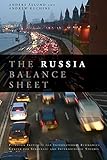The Russia balance sheet / Anders Aslund and Andrew Kuchins.
Material type: TextLanguage: English Publication details: Washington, DC : Peterson Institute for International Economics : Center for Strategic and International Studies, 2009.Description: x, 207 pages : ill. ; 23 cmISBN:
TextLanguage: English Publication details: Washington, DC : Peterson Institute for International Economics : Center for Strategic and International Studies, 2009.Description: x, 207 pages : ill. ; 23 cmISBN: - 9780881324242
- 0881324248
- 330.947
- HC 340.12 A835r 2009
| Item type | Current library | Home library | Collection | Shelving location | Call number | Copy number | Status | Date due | Barcode |
|---|---|---|---|---|---|---|---|---|---|
 Libro
Libro
|
Biblioteca Juan Bosch | Biblioteca Juan Bosch | Ciencias Sociales | Ciencias Sociales (3er. Piso) | HC 340.12 A835r 2009 (Browse shelf(Opens below)) | 1 | Available | 00000110105 |
"April 2009."
Preface -- Map -- Introduction: Why Russia matters and how -- 1: Russia's historical roots -- 2: Political development : from disorder to recentralization of power -- 3: Russia's economic revival: past recovery, future challenges -- 4: Policy on oil and gas -- 5: International economic integration, trade policy, and investment -- 6: Challenges of demography and health -- 7: Russian attitudes toward the West -- 8: Russia as a post-imperial power -- 9: Pressing the "reset button" on US-Russia relations -- Appendix: Key facts on Russia, 2000-2008(p) -- Bibliography -- Timeline of major events -- Abbreviations -- About the authors -- About the organizations -- Russia balance sheet advisory committee.
Product Description: Russia projects a sense of renewed power and prominenence on the world stage; by 2020 it's expected to emerge as the fifth-largest economy in the world. Going forward, how the United States and Russia deal with each and with issues of mutual interest will have a significant impact around the globe. The Russia Balance Sheet sets forth a primer on Russia's current governmental and political infrastructure as well as its opportunity for growth. This important new book provides comprehensive, balanced, and accurate information on all key aspects of Russia and discusses what its status means for the US and other nations. To that end, the authors develop a cohesive, overarching framework that analyzes the nexus point of such areas as economic reforms and integration, domestic politics and society, foreign business partnerships, and energy demands. Based upon this foundation, the book capably suggests constructive policies for Russia and the next US administration that will take office in 2009.


There are no comments on this title.